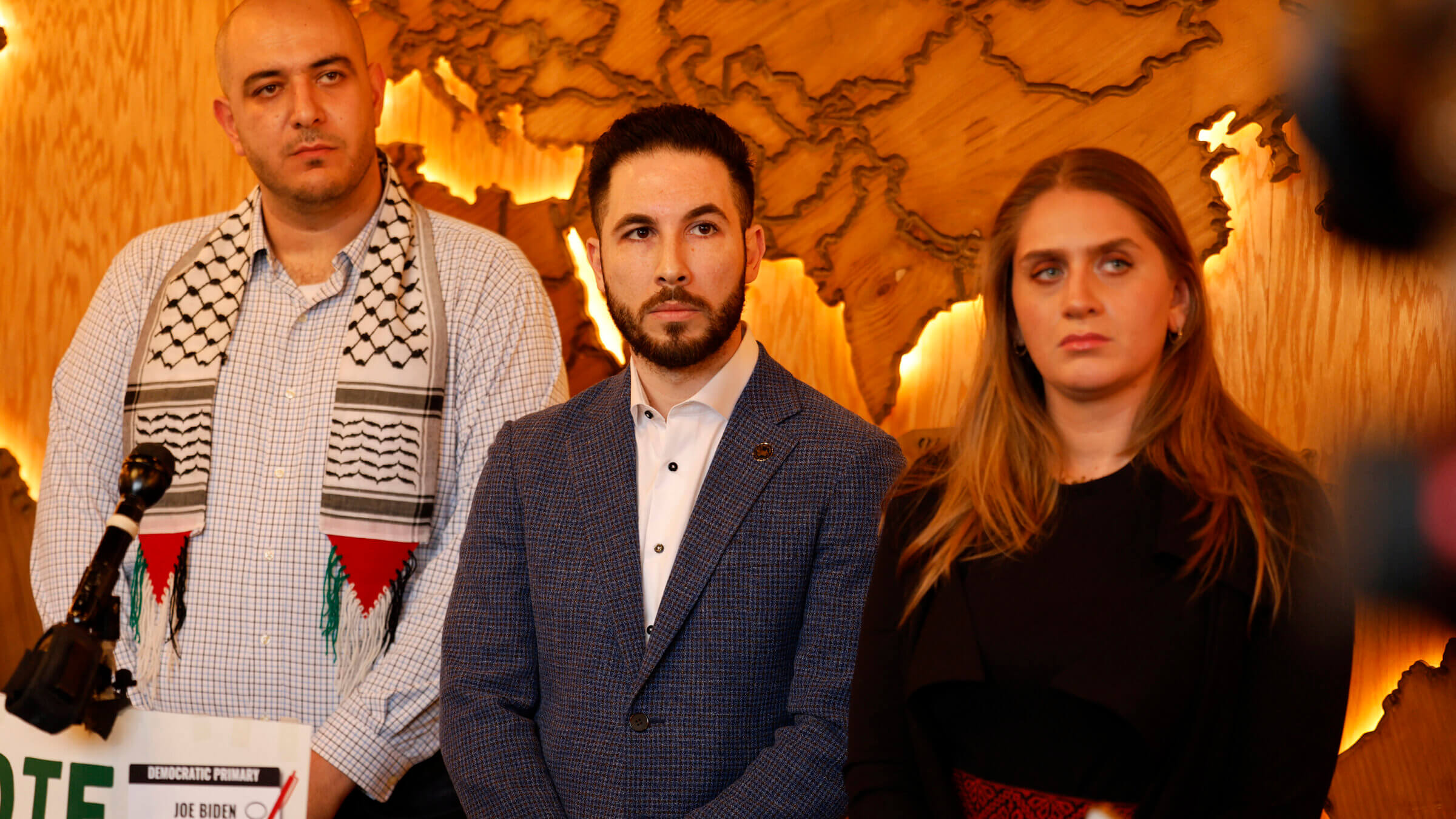One co-founder of the Uncommitted movement will vote for Harris — the other will not
The split highlights the pro-Palestinian movement’s conundrum after it declined to endorse Kamala Harris

Abbas Alawieh, left, Dearborn Mayor Abdullah Hammoud, center, and Layla Elabed, right, co-founders of the Uncommitted movement, the day after Michigan’s presidential primary in February. Photo by Jeff Kowalsky/AFP via Getty Images)
In a split illuminating the difficult choice facing Democrats who supported the pro-Palestinian Uncommitted movement in the primaries, one of the movement’s co-founders will vote for Democratic presidential nominee Vice President Kamala Harris while the other plans to leave the top line of her ballot blank.
It also shows the continued uncertainty over how the Uncommitted — which rallied an estimated 700,000 voters in the primaries to protest President Joe Biden’s handling of the Israel-Hamas war — will cast ballots in this exceedingly tight race for the presidency.
Uncommitted co-founder Abbas Alawieh, a Lebanese American and former chief of staff to Rep. Cori Bush, said on CNN Tuesday that he is voting for Harris even though his movement is not endorsing her. (He had previously made similar statements to other news outlets.) His co-founder, Layla Elabed, told NBC News last week that she will not vote in the presidential race, though she will vote for candidates down ballot.
“She hasn’t earned my vote,” Elabed said of Harris, who has repeatedly committed herself to ensuring Israel’s security, and also said the humanitarian crisis in Gaza is “horrific.”
But Elabed also made clear that she supports Uncommitted voters who choose to vote for Harris to block Trump. That’s “very important,” she said, “because we know how dangerous the Trump presidency is going to be.”
(Elabed’s sister, Rep. Rashida Tlaib, the only Palestinian American in Congress, has declined to endorse Harris. She is the only member of the Squad in Congress, a group of progressives vocal in their criticism of Israel, to withhold an endorsement for the vice president.)
Alawieh and Elabed’s disparate voting choices reflect a broader tension among the Uncommitted, earlier made apparent by its non-endorsement of Harris, which it announced in a statement last month.
As the group declared that it could not endorse Harris, it urged its supporters to do nothing to help Trump.
That includes, the statement said, not voting for a third-party candidate, because that could “inadvertently deliver a Trump presidency” in tight swing states’ contests.
The advice might seem contradictory: Instructing voters to not cast a ballot for Trump or third party candidates would seem to leave Harris as the only option. But Elabed told NBC that asking her to vote “strategically” right now, as she watches continued Israeli attacks on Gaza, “is like asking who we are going to vote for while we are at a funeral.”
Alawieh and Elabed both live in Michigan, which has the largest Arab and Muslim population of any state. Both Harris and Trump see it as critical to a win. Arab Americans represent about 2% of Michigan’s population, and Jews about 1%.
Alawieh explained his intention to vote for Harris much the way Vermont Sen. Bernie Sanders did in a video he released Monday. Sanders, a Jewish, unaffiliated icon in progressive political circles, said that while he is disappointed in Harris’ refusal to get tougher with Israel over the war in Gaza, which has killed more than 40,000 Palestinians according to the Gaza Health Ministry, choosing Trump would be “worse.”
Sanders said he and likeminded voters could press Harris to change tack on Gaza if she wins the White House, but will have no such chance with Trump.
Gaza, Sanders added, “is not the only issue” in the election.
Alawieh, on CNN Tuesday, said Uncommitted voters who are intending to vote for Harris should state so publicly, but “pair their vote” with “a public commitment to pressure her to stop sending the weapons should she become president.”
A message from our CEO & publisher Rachel Fishman Feddersen
I hope you appreciated this article. Before you go, I’d like to ask you to please support the Forward’s award-winning, nonprofit journalism during this critical time.
We’ve set a goal to raise $260,000 by December 31. That’s an ambitious goal, but one that will give us the resources we need to invest in the high quality news, opinion, analysis and cultural coverage that isn’t available anywhere else.
If you feel inspired to make an impact, now is the time to give something back. Join us as a member at your most generous level.
— Rachel Fishman Feddersen, Publisher and CEO